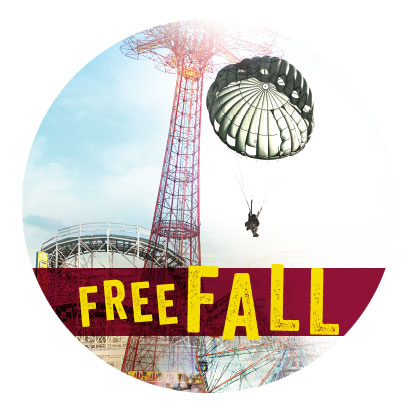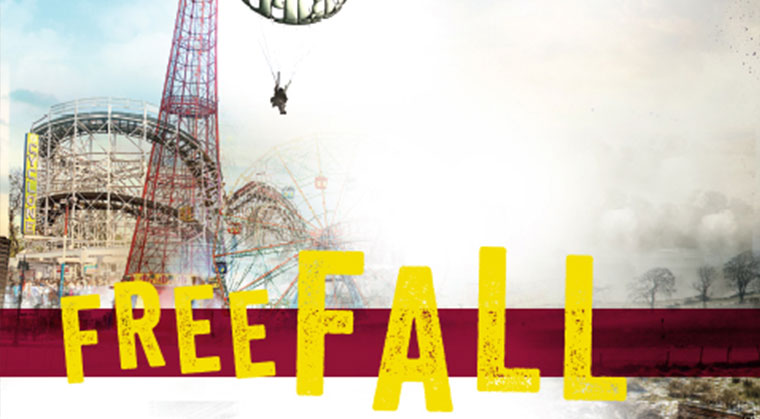Freefall: Chapter 28


M ay 1942
Second Lieutenant Moe Freed had never experienced anything quite like this. The crowding. The chaos. The roar of a hundred engines those revving up for the grim and dangerous crossing and those sighing in relief at having reached journey’s end. The cacophony of ship’s horns — some shrill others deep and mysterious as the sea still others sounding eerily to Moe like a shofar’s heartrending blast.
They arrived at 0500 hours at the New York Port of Embarkation after a short train ride and a march through slumbering New York streets. Now Moe stared at the huge hulk that appeared and disappeared in the early morning fog.
This former palace of pleasure had been a luxury cruise ship before it was taken over by the United States government. Uncle Sam had fitted it out with anti-aircraft guns painted it a steely gray to hide it from the packs of submarines intent on its destruction and somehow made this vessel built to house 1 200 passengers and crew ready for 4 500 troops. The Hopeful: this was the ship that would take him to shores he’d never seen to battles he was eager to join far far away from home.
At the thought of home he felt a sting of pain as sharp as that of the many inoculations the army doctors had given him yesterday the day before embarkation. Suddenly the noise of men and machines disappeared and he was back in the Freed Hotel.
Shabbos was over and he was in his old room. He’d just changed back into his uniform when there was a knock on the door and his father walked in.
“So you leave to England this week” Papa said.
“Yes Papa.”
There was silence. That Moe was used to: His father never chatted never fell into idle talk. But there was something uneasy about the quiet in the room. Was his father angry? Sad? Or perhaps frightened? Moe couldn’t tell.
“May I give you a brachah Moishe Baruch?”
As if in a dream he approached his father. Black eyes met black eyes. Moe bent his head and Yeruchum placed his hands — were they trembling just the slightest? — on the army cap Moe had already put over his yarmulke.
"Yivarechecha Hashem v’yishmerecha…" Yes those hands were trembling…
"Yaer Hashem Panav eleicha vi’chunekah…" His father’s voice seemed to echo endlessly from the walls of the room to the walls of Moe’s heart…
"Yisa Hashem Panav eilechah v’yaseim lecha shalom…" The word shalom peace hung in the air. Moe — Moishe Baruch — opened eyes that were wet and whispered “Amen.”
Yeruchum put his arms on Moe’s shoulders and his lips gently touched Moe’s forehead.
And then Papa was gone before Moe could decide if his father had really wanted to bless him had really wanted to kiss him — or had merely been following his rebbi’s instructions. Before Moe could decide if his father loved him.
“Lieutenant Freed. Sergeant Collins needs the manifest with your Company’s names and serial numbers on the double!”
Wincing as he picked up his barracks bag filled with gear — those inoculations on his arm had hurt — Moe thrust his memories his doubts and questions and longings behind him and raced through the milling crowd to the gangplank.
Everybody but everybody wanted to help win the war. And they were all going to do it at the Brooklyn Navy Yard.
At least that’s what it seemed like to Annie this morning.
The train was packed and as it screeched into York Street Station a roaring tidal wave of passengers surged out onto the platform and up to the street. Annie was carried along with the crowd. She’d been to the Navy Yard already to take a series of physical and written tests so she was prepared for the sight but she still was astonished at the sheer vastness of this city within the city where ships vital to the war effort were either being repaired refitted or built from scratch.
She’d been given a temporary badge which she wore self-consciously on her simple white blouse. A guard at one of the Yard’s several entrances checked her pocketbook — no cameras allowed on Navy property! — and then waved her through.
She stood uncertain and she had to admit scared half to death: Everyone seemed to be rushing and everyone seemed to know exactly what to do. She looked at the giant cranes stabbing into the sky at the jeeps and bulldozers and forklifts racing through the streets. Everywhere there were posters urging workers to put "Safety First." To "Think." To keep quiet because "Loose Lips Sink Ships." And everywhere there were men. Men in naval uniforms men in overalls men wearing welders’ masks or carrying giant boxes on their shoulders.
She felt shy and embarrassed to ask any of these busy men for directions to Building 34 where she was supposed to report. If only there was a woman she could approach… “Hello dearie what are you looking for?”
Oops! We could not locate your form.


